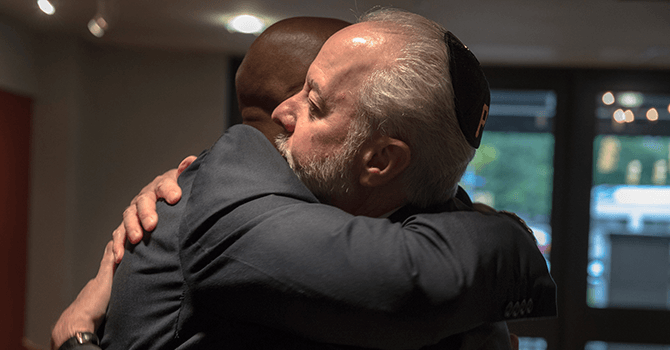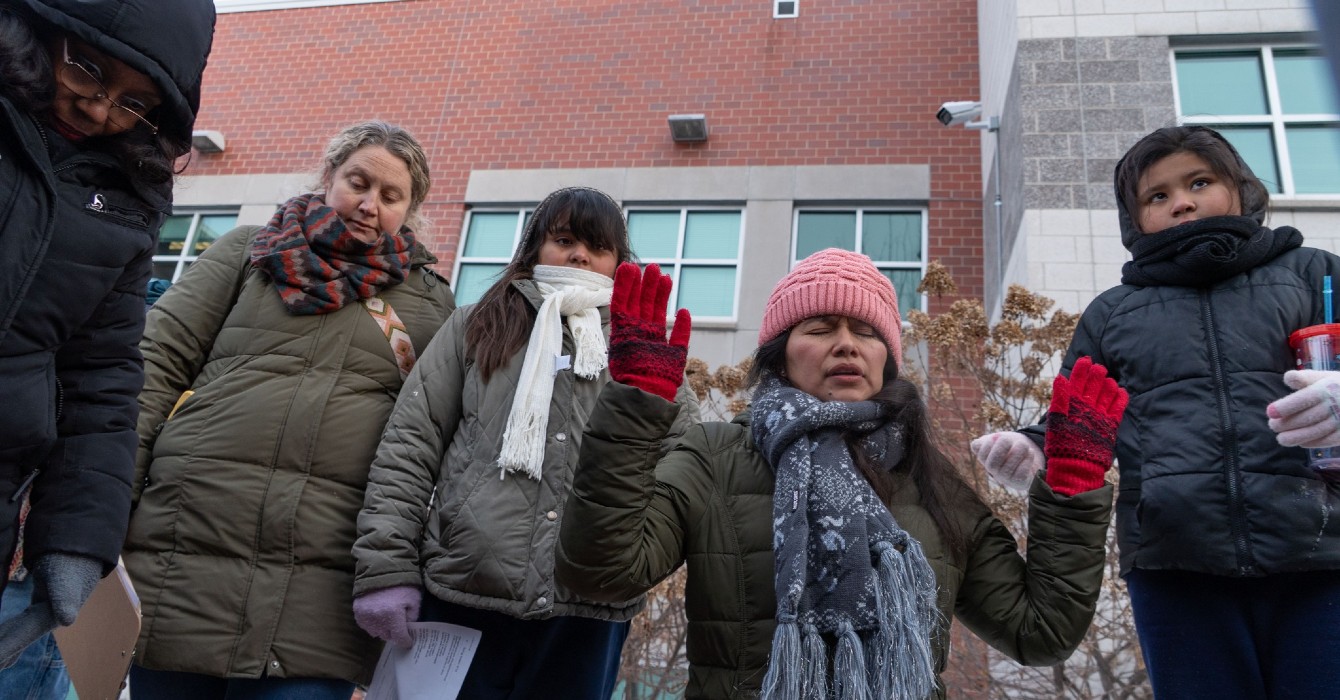When mezuzahs were torn off about a dozen Indiana University students’ dorm room doors in fall 2021, students and staff at the Helene G. Simon Hillel Center on campus brainstormed what they could do to support the university’s Jewish population.
At first, they thought about offering mezuzahs to Jewish students, said Sue Silberberg, the center's executive director. A mezuzah is a scroll inside a decorative case that Jews affix to their doorposts. The scroll has Deuteronomy 6:4-9 and 11:13-21 handwritten in Hebrew.
Then, Silberberg said, a non-Jewish student asked, “Could I put a mezuzah up somehow?”
Soon volunteers were painting wooden mezuzahs red (for IU’s school colors) and distributing them free to anyone who wanted one, along with information about what a mezuzah is and instructions for installing it. The ones for non-Jewish students didn’t contain the sacred scrolls, but they did have a sticker on the outside that said, “I stand with my Jewish friends.”
Several other antisemitic incidents followed, including hateful comments on the online platform Greek Rank. Indiana University has about 4,000 Jewish undergraduates, about 10%-12% of the student population, and historically has been a safe campus for Jewish students, Silberberg said.
But the incidents jarred people. The interest in the Mezuzah Project grew, and about 600 mezuzahs have now been distributed — with more on order.
“A rash of things have happened where students have felt very marginalized. And as things have happened, the Mezuzah Project has become the way to support Jewish students,” she said.
Silberberg spoke with Faith & Leadership’s Sally Hicks about the project and how it might serve as a model for engaging allies. The following is an edited transcript.
Faith & Leadership: How did this project get started?

Sue Silberberg: Students were getting the mezuzahs ripped off their doors. For a freshman who’s coming to college, this is the first time that they’re independently deciding what their Jewish identity means to them.
It’s really a big issue. It’s a big statement for a college student to say, “I’m willing to publicly show that I’m Jewish and willing to publicly put this out there.” Then for those to be ripped off was extremely painful for the students that it happened to.
When things like that happen, students — and any of us — begin to feel very alienated and feel like nobody cares about us and nobody supports us.
F&L: Why do you think this gesture of putting up a mezuzah in solidarity was adopted so readily?
SS: It’s something that is easy to do and something that people can visibly show their support with, and it really lends great support to the Jewish students.
I’ve learned over the years that if what you ask people to do to show their support is relatively easy, people are much more likely to do that.
We’re distributing our second batch of 500 now. We had requests from all over the place, all over campus for them.
This is a way that you can just walk around and see these displayed all over campus. A lot of faculty and staff have gotten them for their office doors, and a number of the departments have put them up on some of the main buildings, including the student union. A lot of students have asked for them and put them up on their own doors.
F&L: Did you all have any concerns about it before it started, or have there been any negatives once it’s gotten underway?
SS: There actually have not been any negatives at all that we’ve known about. The main thing has been how people have just overwhelmingly wanted to be a part of it. I mean, the only challenge has been, we’ve had to keep getting more and more mezuzahs!
IU was a very friendly and safe campus for Jewish students. This is the first time that we’ve seen a lot of antisemitic events.
The mezuzahs were the first one. There was a student who was really badly harassed in her dorm for being Jewish by fellow floor mates. Then there were swastikas that were painted around town. Then in January, these awful, horrible posts were put in this Greek website. They were some of the worst antisemitic comments I’ve ever heard.
F&L: Did you all think about any other gestures of allyship?
SS: I think the mezuzah became the gesture because that’s the first thing that happened. Then it grew as more and more things happened. It just became the way to do it, because it already was in existence. It made so much sense at the time.
F&L: This is a symbolic show of support, but there are other responses to these events as well. What else are students doing?
SS: Months ago, we created a student task force to combat antisemitism, which has about 30 students who are a part of it. We had thought about [the Mezuzah Project] and gotten it started before the task force started, but they’ve taken it on, and really, that’s become one of their major projects. I work with the task force, but these are the students’ ideas.
They’ve done tabling on International Holocaust Day. We just did a names reading of the names of the victims.
Then there’s another organization called Jewbelong. They’ve come to the campus as well. They [were here] over Little 500 weekend, and they had billboard trucks that went around that had messages on them like, “Can a billboard end antisemitism? No. But you’re not a billboard. #EndJewHate.”
Then they made T-shirts that said, “Can a T-shirt end antisemitism? No. But you’re not a T-shirt. #EndJewHate.” We handed out the T-shirts while we were doing the names reading. That was super powerful.
We had planned to do it from 9 a.m. to 9 p.m., but by 1 p.m., we’d already handed out all the T-shirts — we had over 500 — to Jewish and non-Jewish students who all wanted them.
They’ve created an educational module about antisemitism. They presented it to a number of different organizations and departments and fraternities and sororities that wanted education.
That’s student-centered; it’s a student teaching students. It’s been really powerful to see them going around campus and teaching their peers about antisemitism.
F&L: Do you have any thoughts or advice for groups seeking to build support?
SS: I would say first and foremost is for campuses to recognize that Jews are a minority. Jewish students face antisemitism.
On many college campuses across the country, and I hear this from my colleagues all the time, Jews are not really recognized as a minority. Even though we are definitely 100% a minority, on many college campuses, the stereotype is that Jews are white and privileged and therefore Jews don’t face antisemitism. And that it doesn’t really hurt Jews if they do face it, which is a terribly untrue stereotype.
First of all, not all Jews are white and not all Jews are privileged. But even if all Jews were white, even if all Jews were privileged — which, again, is not true — it does not mean that it doesn’t hurt to be discriminated against and to face antisemitism.
I would say the first step is recognizing it, on most college campuses. The next step after it’s recognized is condemning it and understanding that it really does hurt and affect Jewish students and that Jewish students do feel marginalized.
F&L: Your status as an organization has changed recently. Talk about that.
SS: Usually — and that’s how we’ve always been — Hillel is an organization that serves the university students, but they don’t have any official sanction or recognition within the university.
Now we are officially the Jewish Culture Center for Indiana University. We’re part of the Office of the Vice President for Diversity, Equity and Multicultural Affairs.
F&L: Do you think you will continue to hand out mezuzahs?
SS: We actually right now have about 150 orders to fulfill. I think as long as we get requests, we’ll continue to do it. We’ll see next year; if it seems like something that people want to continue and the task force wants to continue, we’ll definitely continue it.













